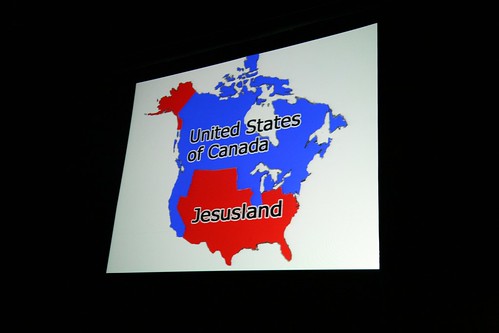See the last three posts if you’re still catching up. Some people say ‘preaching is dead’. I often think so as well, but I still believe our post-Christian culture opens new opportunities for the ‘preacher’ today.
Postmodernity blurs the lines between everything - fact and fiction, on and offline, news and entertainment. Although there are inherent dangers to this blurring of boundaries, in many ways this cultural milieu provides the opportunity for us to preach a more holistic message. God’s story and the human story do not need to be separate. Faith and everyday life no longer need to be compartmentalized. The good news of the kingdom of God can be preached as a reality that can permeate every aspect of humanity.
Another new reality for our preaching today is the opportunity to call people to change immediately. Gone are the days where everyone requires all the empirical evidence upfront and then weighs out all the pros and cons. People today often only process information that they can apply immediately. Preaching to a postmodern world is conducive to action-oriented life transformation. Just as in the Scriptures James speaks strongly of acting on what we learn, when postmodern preaching offers people clear life applications, people have an opportunity to move towards faith, even if incrementally.
One of the most unique opportunities of our postmodern times is for preachers and followers of Jesus themselves. Being a post-Christian era, this offers us a unique time of humility, revisiting our roots and faith, re-placing our trust to where it belongs, and re-aligning ourselves back to becoming the church that Jesus had in mind when He was on the cross. As we do this, preachers have a rare opportunity to shake the culture again. Postmodern culture does not expect anything relevant to be coming out of the church. But when they are encountered by a church that is re-aligned with God and the voice of God is heard in a way that connects, it will be shockingly relevant, because that which is eternal is always relevant.
Spirituality is at an all-time high today, and religion is disdained more than ever. When we reveal to the postmodern world that Christ was very much the same way, this will immediately resonate. Though postmoderns want spiritual values without constraints, if we preach the radical values of Christ, they will form their own boundaries. Though postmoderns distrust institutions, if we preach that Christ did not come to establish a religion but a movement of followers that will change the world, the church will be seen differently. Though postmoderns stress personal fulfillment, if we preach that following Jesus brings people closer to the person they were always created to be, it can bring people to craving this deeper place of fulfillment. As Graham Johnston says, “Hope in Christ addresses the restlessness and arbitrary existence of the postmodern world”
The role of preaching in a postmodern world is just as crucial as ever. Although the challenges have changed since the modern era, the greatest needs of a human soul remain the same. Biblical and relevant preaching can transcend all of the negative stereotypes of postmodernity. Preaching is able to ask what no one dares to ask, dialog even deeper into the human heart, and proclaim a story that all are invited to participate in. Preaching is able to reveal to people what God is doing; in the life of the preacher, the world around them, and even in their own humanity. Preaching is able to integrate God with all the disconnected realities people live in today, calling them to change, while surprising them about the goodness of God. Preachers must learn to see the invisible and hear the inaudible, that the heart of the postmodern world is ‘preaching’ for us to preach Christ centered messages clearly to them.
For the latest comments on this and other entries see One Life.












































 No I didn’t go this year. But
No I didn’t go this year. But 
 Some personal highlights from Neil Cole's Organic Church
Some personal highlights from Neil Cole's Organic Church





